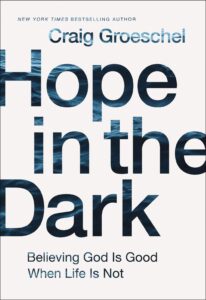
As the title suggests, the book Hope in the Dark, written by Craig Groeschel, speaks about how we can find hope in the midst of despair and hold on to it while navigating a tough phase in life. It encourages us to look beyond our present and have our faith rooted in God’s promises.
As the author walks us through the life of prophet Habakkuk in this book, he encourages us to feel and go through the motions of fear, doubt, unbelief, confusion, etc., that we experience while going through hard times—a process which helps us become mature in faith and discover God’s sovereignty.
The book of Habakkuk also shows human vulnerability while going through tough times and so, it becomes easier for us—readers—to relate to what the author is conveying. Also, it is interesting to know that a prophet—who lived long ago—had thoughts and concerns similar to ours and that God was interested in him and his life.
The author cites examples from his life and from the lives of those around him to make us understand that sometimes unexpected and painful events happen in our lives and we may not know why, but even in that unbelief if we are willing to believe, God will meet us halfway.
The moment we choose to listen, we shift focus from ‘us’ to God, which leads us to build a closer relationship with God.
Our struggles and darkest times of life are unique to each of us. Our painful experiences are different from each other. For some, it can be a terrible illness; for others, it could be a problem in the family and the list goes on. In fact, if we take into account the situation in the world right now, hopelessness, fear and uncertainty gripped us for over a year due to the Covid-19 pandemic. Millions of people have lost their lives already and it has caused the rest of us to think about what the future holds for us and whether we will even get there. The doubt and the fear around vaccine and its possible side effects have only added to our dilemma. In such bleak times, faith brings a glimmer of hope.
The author points to Habakkuk who boldly told God that whatever was happening around him was unfair. He questioned God about the things he did not understand; that why God allowed certain things even though they were totally against His character. He spoke out his true feelings about how afraid and confused he was. And, at the end, God decides to answer his questions—which tells us that if we are ready to ask questions, God will surely speak and help us see and understand the larger picture even if his answer is not what we would like to hear.
The author takes us deeper into Habakkuk’s life to show the kind of attitude we can develop during tough times. He goes on to talk about listening to God. The moment we choose to listen, we shift focus from ‘us’ to God, which leads us to build a closer relationship with God. Another important quality is waiting on God because when we go through the toughest time in life we feel as if time has slowed down and everything around us has come to a stand still. But God always acts in his time. In our waiting, we can go back and remember what God did for us in the past and be reassured that he will do it again.
…the author urges us to remember the meaning of the name Habakkuk which is “to wrestle and to embrace’’—it is in both of these that we truly find our way to hope.
By looking into the lives of Joseph, Paul and Israelites, to name a few, the author tells us that in the waiting, God is preparing us for something greater as we continue to serve God. In times when we feel our faith is shaken, the author compels us to remember these words from Habakkuk, “But the Lord…’’ which means even despite all that is going on around us, we know that the Lord is on the throne. His character never changes and that helps us to believe in who God is and helps us to take a stand; believing is the first step to finding hope.
Finally, the author urges us to remember the meaning of the name Habakkuk which is “to wrestle and to embrace’’—it is in both of these that we truly find our way to hope. The book asks us to have the right perspective and experience God in a closer way.
On a personal level, this book was a blessing. It showed me that even in hurting, if I am willing to be honest with God, he will certainly reveal himself in ways I have never known him before. And that helps me to become more confident in him rather than letting the pain override me. God will certainly do to us what he did for prophet Habakkuk.






